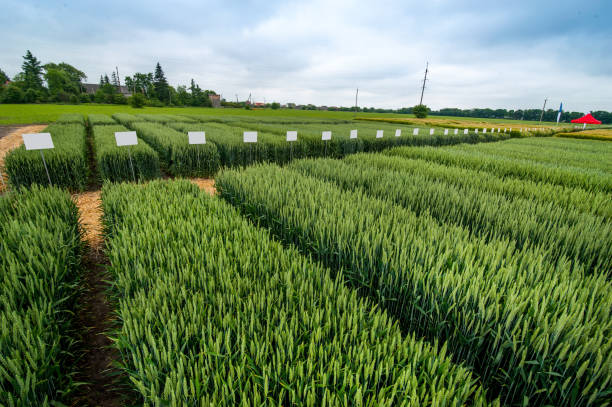Nigeria, known as the “Giant of Africa,” boasts a vibrant agricultural sector that plays a crucial role in the country’s economy and food security. From vast crop plantations to thriving livestock and fisheries industries, Nigeria’s agricultural sectors contribute significantly to the nation’s overall value. Evaluating and understanding this value is essential for sustainable development and progress. In this article, we delve into the overall value in all agricultural sectors in Nigeria, exploring their economic, food security, and social contributions.
Distribution of Gross Domestic Product (GDP) across Economic Sectors in Nigeria
According to the data from Statista, Nigeria’s GDP in 2021 was distributed across various economic sectors. Agriculture accounted for approximately 23.36 percent, industry contributed 31.41 percent, and the services sector accounted for 43.79 percent.
Economic Sectors in Nigeria
The economic activity in a country can typically be categorized into three sectors: the primary sector, which includes agriculture, forestry, and fishing; the secondary sector, which encompasses industries involved in manufacturing and processing goods; and the tertiary sector, which comprises services such as IT, tourism, and banking. Analyzing the performance of these sectors provides insights into a country’s contribution to its GDP and overall economic development.
Rise of the Services Sector in Nigeria
Similar to many flourishing economies worldwide, Nigeria is experiencing a surge in its services sector. This growth can be attributed to the increasing urbanization as more individuals migrate from rural areas to cities in search of employment opportunities. Nigeria’s economic strategy focuses on telecommunications, financial services, and technology, which is expected to yield positive results and drive GDP growth. Additionally, Nigeria’s reliance on oil has played a significant role in its economic success. Between 2001 and 2010, Nigeria was among the countries with the highest GDP growth globally. However, the fluctuation in oil prices resulted in a decline in GDP growth in 2016 and led to the country’s first trade deficit in over a decade.
Overview of Agricultural Sectors in Nigeria
Major agricultural sectors in Nigeria
Nigeria’s agricultural sector comprises several key sectors that contribute significantly to the country’s economy. These sectors include crop production, livestock rearing, and fisheries. Crop production involves the cultivation of various crops such as cereals, vegetables, fruits, and cash crops like cocoa and rubber. Livestock sector involves the rearing of animals such as cattle, poultry, sheep, and goats for meat, milk, and other by-products. The fisheries sector focuses on capturing fish from natural water bodies as well as aquaculture practices.
Contribution of each sector to the Nigerian economy
Each agricultural sector plays a vital role in Nigeria’s economy. Crop production contributes significantly to food production and export earnings, with cash crops being major revenue sources. Livestock sector contributes to the production of meat, dairy products, and hides and skins, supporting both local consumption and export markets. Fisheries sector provides a valuable source of protein, income, and employment opportunities, particularly for coastal communities.
Challenges faced by the agricultural sectors
Despite the immense potential, Nigeria’s agricultural sectors face numerous challenges. These include inadequate infrastructure, limited access to finance and credit facilities, outdated farming practices, post-harvest losses, and market inefficiencies. Additionally, climate change impacts, including erratic rainfall patterns and increased pest and disease outbreaks, pose significant challenges to agricultural productivity. Limited access to modern technologies, lack of skilled manpower, and inadequate storage and processing facilities further hinder sector growth.
Inadequate government support and policy inconsistencies have also hampered the agricultural sectors’ development. Insufficient investments in research and development, inadequate extension services, and weak linkages between farmers and markets exacerbate the challenges faced by the agricultural sectors in Nigeria.
Despite these obstacles, the agricultural sectors continue to be a crucial component of Nigeria’s economy, providing employment opportunities, contributing to the Gross Domestic Product (GDP), and ensuring food security for the population.
As Nigeria strives to diversify its economy and reduce its dependence on oil revenue, the agricultural sectors offer immense potential for growth, job creation, and poverty reduction. With the right policies, investments, and support, the agricultural sectors can play an even more significant role in transforming Nigeria’s economy.
Evaluating the Value in Agricultural Sectors
Assessing the value in agricultural sectors is crucial for understanding their impact on the Nigerian economy and society as a whole. By evaluating the different dimensions of value, we can gain insights into the contributions made by these sectors and identify areas for improvement. In this section, we will explore three key aspects of evaluating the value in agricultural sectors: economic value, food security and nutrition value, and social value.
Economic Value
Agricultural sectors play a significant role in the Nigerian economy, contributing to the country’s Gross Domestic Product (GDP), employment generation, and foreign exchange earnings. By assessing the economic value, we can better understand the sector’s impact and potential for growth.
- Gross Domestic Product (GDP) Contribution: Agriculture remains a major contributor to Nigeria’s GDP. It provides a substantial share of the nation’s total output, especially in rural areas. Evaluating the GDP contribution helps policymakers and investors gauge the sector’s overall economic performance and its relative importance compared to other sectors.
- Employment Generation: Agriculture is a significant source of employment, particularly for rural communities. Assessing the number of jobs created by agricultural sectors provides insights into their role in reducing unemployment rates, stimulating rural development, and improving livelihoods.
- Foreign Exchange Earnings: Nigeria has the potential to generate foreign exchange through agricultural exports. Evaluating the value of agricultural exports helps determine the sector’s contribution to foreign exchange reserves, reducing reliance on imports, and promoting a favorable balance of trade.
Food Security and Nutrition Value
Agricultural sectors have a fundamental role in ensuring food security and improving nutrition within Nigeria. Evaluating the food security and nutrition value helps understand how well these sectors are meeting the country’s domestic food demand and addressing malnutrition challenges.
- Meeting Domestic Food Demand: Assessing the sector’s ability to meet domestic food demand is essential for understanding the country’s self-sufficiency in food production. It involves evaluating factors such as crop yields, livestock production, and fisheries output, and their capacity to meet the nutritional needs of the population.
- Improving Nutrition and Reducing Malnutrition: Agricultural sectors also contribute to improving nutrition by producing diverse and nutrient-rich crops, livestock, and fish. Evaluating the nutritional value of agricultural outputs and the effectiveness of programs targeting malnutrition allows for the identification of gaps and opportunities for improvement.
Social Value
The value of agricultural sectors extends beyond economic considerations, encompassing social aspects such as poverty reduction, rural development, and gender equality.
- Poverty Reduction and Rural Development: Agricultural sectors have the potential to uplift rural communities and reduce poverty by providing employment opportunities and income generation. Evaluating their impact on poverty reduction and rural development helps identify strategies and interventions to maximize their positive social outcomes.
- Empowering Smallholder Farmers and Rural Communities: Smallholder farmers form the backbone of agricultural sectors in Nigeria. Evaluating the social value involves assessing initiatives that empower and support small-scale farmers, such as access to credit, training programs, and market linkages. Empowering these farmers can enhance their livelihoods and contribute to inclusive growth.
- Promoting Gender Equality in Agriculture: Women play a significant role in agricultural production, yet they often face gender-specific challenges and inequalities. Evaluating the social value involves assessing the sector’s efforts in promoting gender equality, such as access to resources, decision-making roles, and income generation opportunities for women farmers.
By evaluating the economic, food security and nutrition, and social value of agricultural sectors, investors can gain a comprehensive understanding of their contributions and identify areas that require attention and investment. This evaluation serves as a foundation for informed decision-making and the development of policies and programs that can unlock the full potential of agriculture in Nigeria.
Key Indicators of Value in Agricultural Sectors
To truly assess the overall value in agricultural sectors in Nigeria, it is important to look at key indicators that provide insights into the performance and potential of each sector. These indicators help gauge the productivity, economic contribution, and sustainability of agricultural activities. Here are some key indicators that shed light on the value of agricultural sectors in Nigeria:
Crop Production Sector
- Yield per hectare: The average crop yield per hectare is a crucial indicator of agricultural productivity. Higher yields signify efficient farming practices, improved seeds, better irrigation systems, and effective pest and disease management. Monitoring and increasing crop yields contribute significantly to the economic value of the sector.
- Crop diversification and value-added products: The diversity of crops grown and the ability to process them into value-added products also add value to the agricultural sector. Diversification reduces dependency on a single crop and opens up avenues for income generation and market opportunities. Value addition through processing and packaging enhances the sector’s economic viability and creates employment opportunities.
Livestock Sector
- Livestock population and productivity: The size and productivity of the livestock population, including cattle, sheep, goats, and poultry, are important indicators of the livestock sector’s value. An increase in livestock numbers and improved productivity through better animal husbandry practices contribute to meat, milk, and egg production, enhancing the sector’s economic value.
- Value chain development and processing: The development of a robust livestock value chain, including animal feed production, processing facilities, and marketing channels, adds value to the sector. Efficient value chains enable farmers to access larger markets, improve product quality, and increase profitability.
Fisheries Sector
- Fish production and aquaculture development: The volume of fish caught in inland water bodies and the development of aquaculture contribute to the value of the fisheries sector. Sustainable fishing practices, investment in fish farms, and the adoption of modern aquaculture techniques help meet the growing demand for fish and seafood, while also creating employment opportunities.
- Employment and income generation: The fisheries sector plays a crucial role in providing livelihoods for coastal communities and inland fishing communities. The number of people employed in fishing and related activities, as well as the income generated by these individuals, reflect the social and economic value of the sector.
Monitoring these key indicators allows policymakers, researchers, and investors to track the progress and performance of agricultural sectors in Nigeria. It helps identify areas of improvement, highlights success stories, and informs strategic interventions for sustainable growth.
By focusing on these key indicators, Nigeria can unlock the full potential and value of its agricultural sectors.
Government Initiatives and Investments

The Nigerian government recognizes the pivotal role of agriculture in driving economic growth, reducing poverty, and ensuring food security. To unlock the full potential of the agricultural sectors, the government has implemented various initiatives and made significant investments. In this section, we will explore some of the key government-driven efforts that have contributed to the overall value in Nigeria’s agricultural sectors.
Agricultural policies and programs:
- Agricultural Transformation Agenda (ATA): Launched in 2013, the ATA aimed to transform Nigerian agriculture into a competitive, inclusive, and sustainable sector. It focused on policy reforms, increased investment, and enhanced productivity in key value chains.
- Green Alternative: In 2016, the government introduced the Green Alternative policy as a successor to the ATA. This policy emphasizes diversification, value addition, agro-processing, and promoting private sector participation.
- Anchor Borrowers Program: This initiative provides farmers with access to credit facilities to enhance their productivity. It has played a crucial role in boosting crop production and empowering smallholder farmers.
Infrastructure development:
- Rural infrastructure projects: The government has prioritized the development of rural infrastructure such as roads, irrigation systems, and storage facilities. These infrastructure investments improve farmers’ access to markets, reduce post-harvest losses, and enhance overall productivity.
- Market linkages and agro-processing zones: Efforts have been made to establish agro-processing zones across the country, which facilitate value addition and agribusiness development. These zones provide necessary infrastructure, incentives, and market linkages to agro-processing industries.
Research and development in agriculture:
- Agricultural research institutes: Nigeria has several research institutes dedicated to agricultural development. These institutes focus on developing improved seed varieties, promoting sustainable farming practices, and providing technical assistance to farmers.
- Extension services: The government invests in extension services to disseminate knowledge, best practices, and new technologies to farmers. Extension agents provide training, advisory support, and guidance to enhance farmers’ productivity and efficiency.
Public-private partnerships:
- Growth Enhancement Support Scheme (GESS): This scheme encourages private sector participation by subsidizing inputs such as fertilizers and seeds. It has increased farmers’ access to quality inputs and improved agricultural productivity.
- Agricultural finance and investment schemes: The government collaborates with financial institutions to provide affordable credit and financial services tailored to the agricultural sector. These initiatives enable farmers to access capital for investment and growth.
The government’s initiatives and investments have played a crucial role in transforming Nigeria’s agricultural sectors. However, it is important to ensure effective implementation, monitor progress, and address any existing challenges to maximize their impact. By continuing to support and prioritize agriculture, the Nigerian government can sustain the overall value in the agricultural sectors, drive economic growth, and improve the livelihoods of millions of farmers across the country.
Case Studies of Successful Agricultural Sectors
Agricultural sectors in Nigeria have demonstrated remarkable potential for success, and several case studies stand out as examples of sectors that have achieved significant value. These case studies provide valuable insights into the factors contributing to their success and offer lessons that can be applied to other agricultural sectors. Let’s explore some of these noteworthy examples:
- Cocoa Production in Ondo State:
Ondo State has emerged as a leading producer of cocoa in Nigeria. The sector has experienced steady growth due to strategic investments in research, farmer training, and infrastructure development. The state government collaborated with agricultural institutions and private investors to improve cocoa farming practices, enhance processing facilities, and establish effective marketing channels. As a result, cocoa production and quality have significantly improved, leading to increased export earnings and improved livelihoods for cocoa farmers.
- Poultry Farming in Kano State:
Kano State has witnessed a remarkable transformation in its poultry farming sector. Through focused government interventions and support, the state has invested in breed improvement programs, disease control measures, and capacity building for farmers. Additionally, Kano State implemented policies to attract private investments in processing and value-added activities. This comprehensive approach has propelled the poultry sector, leading to increased productivity, job creation, and self-sufficiency in poultry products.
- Rice Cultivation in Ebonyi State:
Ebonyi State has become a major player in rice production in Nigeria. The state government implemented a strategic agricultural development plan that prioritized rice cultivation and achieved remarkable results. By providing farmers with improved seeds, fertilizers, and access to mechanization, Ebonyi State increased rice yields and reduced post-harvest losses. The state also established rice processing mills and implemented policies to encourage value addition and local consumption. As a result, Ebonyi State has significantly reduced its dependence on imported rice and boosted the income of rice farmers.
- Horticulture in Plateau State:
Plateau State has harnessed its favorable climatic conditions to develop a thriving horticulture sector. The state has focused on producing high-value fruits, vegetables, and flowers for local and international markets. The Plateau State government, in collaboration with agricultural agencies and private investors, provided technical assistance, irrigation infrastructure, and access to markets. These efforts have led to increased production, improved product quality, and the creation of employment opportunities along the horticultural value chain.
These case studies demonstrate that a combination of government support, private sector involvement, and stakeholder collaboration can lead to successful agricultural sectors. Key factors contributing to their success include targeted investments in research and development, infrastructure development, capacity building, value chain development, and policy reforms.
Lessons learned from these case studies can be replicated in other agricultural sectors across Nigeria. By adapting and implementing similar strategies, it is possible to unlock the immense potential and generate value in various agricultural sectors, ensuring sustainable growth, improved livelihoods, and food security for the nation.
As Nigeria continues to invest in its agricultural sectors, it is essential to draw inspiration from these success stories and leverage them to drive further development and progress. By learning from both the achievements and challenges faced by these sectors, Nigeria can build a vibrant and resilient agricultural sector that contributes significantly to the nation’s overall value and economic growth.
Challenges and Future Opportunities

Agriculture in Nigeria faces various challenges that hinder its full potential. However, these challenges also present opportunities for growth and improvement. In this section, we will discuss the major challenges faced by the agricultural sector in Nigeria and explore the future opportunities that lie ahead.
Addressing infrastructure and logistics constraints:
- Inadequate transportation networks: The lack of well-connected roads, railways, and ports hampers the efficient movement of agricultural produce from rural areas to markets, resulting in post-harvest losses.
- Insufficient storage and processing facilities: Limited access to modern storage and processing facilities leads to spoilage of perishable crops and reduces their market value.
- Improving infrastructure: Investing in infrastructure development, including transportation networks, storage facilities, and processing units, can enhance the efficiency and competitiveness of the agricultural supply chain.
Climate change and sustainable agricultural practices:
- Changing weather patterns: Climate change poses a significant threat to agriculture, impacting crop yields, livestock health, and water availability.
- Promoting climate-smart agriculture: Encouraging sustainable farming practices such as agroforestry, conservation agriculture, and efficient water management can build resilience to climate change and improve productivity.
- Research and adaptation: Investing in research and development for climate-resilient crops, improved irrigation techniques, and eco-friendly pest management can help farmers adapt to changing environmental conditions.
Harnessing technology and innovation:
- Limited access to technology: Many smallholder farmers lack access to modern agricultural technologies, hindering their productivity and efficiency.
- Digital solutions and precision agriculture: Utilizing digital tools, such as mobile apps, remote sensing, and data analytics, can enhance farming practices, optimize resource utilization, and improve decision-making.
- Promoting innovation and entrepreneurship: Encouraging innovation in agricultural value chains, supporting agri-tech startups, and fostering collaboration between technology providers and farmers can drive agricultural transformation.
Export opportunities and regional integration:
- Expanding export markets: Nigeria has vast potential to export agricultural products to regional and international markets, but trade barriers, quality standards, and market access issues need to be addressed.
- Regional integration: Strengthening partnerships and trade agreements within the Economic Community of West African States (ECOWAS) and the African Continental Free Trade Area (AfCFTA) can provide expanded market opportunities for Nigerian agricultural products.
- Quality assurance and certification: Implementing robust quality control measures, certification systems, and adherence to international standards will enhance the competitiveness of Nigerian agricultural exports.
Despite the challenges, Nigeria’s agricultural sector holds immense promise for the future. By addressing infrastructure gaps, embracing sustainable practices, leveraging technology, and exploring export opportunities, the sector can thrive and contribute significantly to economic growth, job creation, food security, and poverty reduction. It requires concerted efforts from the government, private sector, farmers, and other investors to unlock the full potential of agriculture in Nigeria and secure a prosperous future for the nation.
Conclusion
In conclusion, the agricultural sectors in Nigeria play a pivotal role in the country’s economy, food security, and social development. Assessing the overall value of these sectors is crucial for understanding their contribution and identifying areas for improvement.
Throughout this article, we have explored the different agricultural sectors in Nigeria, including crop production, livestock, and fisheries, and examined their economic, food security, and social values. These sectors not only contribute to the Gross Domestic Product (GDP) and employment generation but also ensure food availability, improve nutrition, alleviate poverty, and empower rural communities.
The government has an essential role to play in fostering the growth and development of these sectors.
However, there are some challenges but by overcoming these challenges and seizing opportunities, Nigeria can strengthen its position as a leading agricultural nation in Africa and contribute to regional integration.
Notwithstanding, the overall value in all agricultural sectors in Nigeria is significant. The continuous investment and support from the government, private sector, and investors are essential to sustain and enhance the value generated by these sectors. With concerted efforts and strategic interventions, Nigeria’s agricultural sectors have a promising future, driving economic growth, ensuring food security, and improving the livelihoods of millions of Nigerians.












